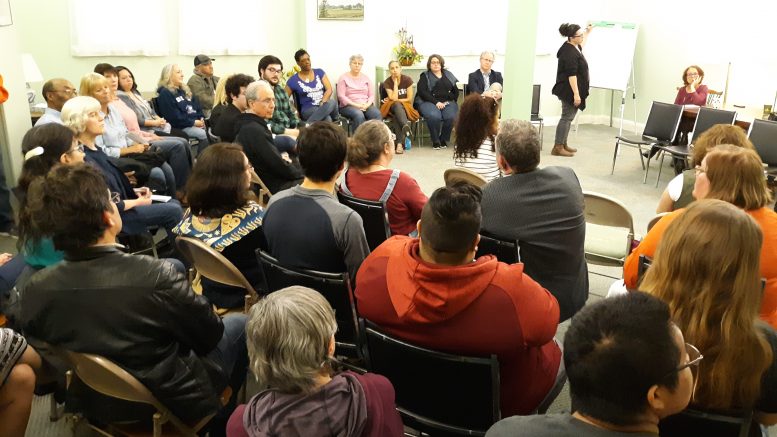By JAN LARSON McLAUGHLIN
BG Independent News
On Monday, Bowling Green City Council expanded the community’s anti-discrimination laws in response to the attack more than two years ago of two teenage customers of color by two white men in the Waffle House on East Wooster Street.
But right up to the vote, there were questions about the ordinance, a last ditch effort to expand it even further, and a muddle of motions.
The four changes added to the city’s anti-discrimination laws, as suggested by La Conexion, were:
- Adding ethnicity, source of income, and immigration status as new protected classes to the existing code.
- Including the concept of “actual” and “perceived” classes, as many discrimination incidents are based on perceptions.
- Improving accountability and transparency in the reporting system by establishing a panel to accept and handle complaints. The panel expands this system from the city administrator to also include an elected member of City Council, as well as the president of the Human Relations Commission (or their designee).
- Protecting employees who report or intervene to stop acts of discrimination.
One provision requested by La Conexion that failed to make the ordinance was a requirement that businesses train their employees on anti-discrimination policies – or be liable if they don’t.
The training is already being offered free of charge by the Bowling Green Police Division, but the city cannot require businesses to send their employees to it, council members said.
Daniel Gordon, who is co-chair of La Conexion’s Policy Committee, thanked City Council for the reforms to the city’s anti-discrimination laws.
“They are strong action steps to make Bowling Green a safer and freer place for everyone, helping us become a more welcoming community and protecting civil rights and local democracy for all of us, at a time when such protection is desperately needed,” he said.
Gordon also encouraged City Council to continue exploring ways to better protect both employees and patrons at businesses.
“Patrons obviously need to feel safe when they visit businesses. But employees also need to feel safe,” he said. “Employees need to feel safe in reporting incidents of discrimination and hate crimes, and they need to feel that they can safely and effectively intervene in such situations, when and where appropriate, without putting themselves in danger. We support anything you can do to adopt stronger protections for both patrons and employees.”
During discussion, council member Bill Herald asked how often the original anti-discrimination ordinance had been used since it was adopted in 2010. Municipal Administrator Lori Tretter said she did not recall any discrimination complaints filed since then.
Council member John Zanfardino noted the original ordinances, approved by city voters, were quite controversial.
“There was quite a brouhaha in Bowling Green,” he said. There was a fear by some that the new anti-discrimination laws would lead to many frivolous lawsuits. “Which we clearly have not seen.”
“These kind of things try to give everyone the same rights we all have,” Zanfardino said. “I’m proud of what we did 10 years ago and equally proud of the vote I’ll be casting tonight.”
As council prepared to vote, council member Jeff Dennis proposed an amendment that he had emailed to fellow council members at 4 that afternoon. The amendment would add protection for employees so they would not face retaliation from their employer if they reported discrimination.
Dennis explained the amendment put no liability on businesses, but provided protection for workers.
City Attorney Mike Marsh said the amendment would be similar to a “whistleblower clause.”
Council member Greg Robinette objected to the last minute amendment. He said he was prepared to vote in favor of the additions to the anti-discrimination ordinance, but asked that it be tabled so members could review the proposed amendment.
Council member Sandy Rowland also expressed her dislike of late changes.
“I would support this whole-heartedly,” but really wanted more time to review it, she said.
Dennis agreed that the amendment was late, but added that it was a “pretty straightforward” attempt to strengthen the ordinance.
Council President Mark Hollenbaugh said the anti-discrimination ordinance changes were proposed in early May – giving plenty of time for amendments prior to Monday afternoon.
Hollenbaugh said he plans to give council instructions in the future on how to avoid late amendments to legislation.
Then a slurry of motions occurred, with the first being a motion to amend the ordinance. Before that could be voted on, a motion to table the motion to amend was proposed. That failed with “yes” votes by Rachel Phipps, Bill Herald and Greg Robinette, and “no” votes by Mark Hollenbaugh, Sandy Rowland, John Zanfardino and Jeff Dennis.
Then came a motion to add the amendment to the ordinance. That passed with the only “no” vote from Robinette due to what he called procedural issues.
And finally came the motion to adopt the ordinance, which passed with Robinette being the only “no” vote.
“This is a great step in the right direction, and another example of our community leading on a very important issue,” Dennis said after the meeting.
But Dennis added that the city must continue to look for ways to prevent discrimination and be welcoming.
“We need to continue to monitor and look for ways to encourage greater employer participation in our training programs. We should also consider taking a hard look at how we can encourage greater diversity and representation on our boards, commissions, and in elected offices,” Dennis said. “This legislation is certainly a step forward, but there is much work left to be done.”



